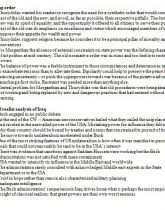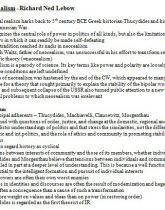Studijní materiál: Classical Realism - Richard Ned Lebow
Skrýt detaily | Oblíbený- Kvalita:80,5 %
- Typ:Studijní materiál
- Univerzita:Univerzita Karlova v Praze
- Fakulta:Fakulta sociálních věd
- Kategorie:Humanitní vědy
- Podkategorie:Politologie
- Předmět:Mezinárodní vztahy
- Autor:clean.bandit
- Ročník:3. ročník
- Rozsah A4:3 strán
- Zobrazeno:830 x
- Stažené:0 x
- Velikost:0,1 MB
- Formát a přípona:MS Office Word (.doc)
- Jazyk:anglický
- ID projektu:9388
- Poslední úprava:09.01.2017
Classical Realism - Richard Ned Lebow
- classical realism harks back to 5th century BCE Greek historian Thucydides and his account of the Peloponnesian War.
- It recognizes the central role of power in politics of all kinds, but also the limitations of power and the ways in which it can readily be made self-defeating
- Realist tradition reached its nadir in neorealism
- Kenneth Waltz, father of neorealism, was unsuccessful in his effort to transform realism into a scientific theory (=neorealism)
- Neorealism is a parody of science. Its key terms like power and polarity are loosely formulated and its scope conditions are left undefined
- Decline of neorealism was hastened by the end of the CW, which appeared to many as a critical test case for a theory that sought primarily to explain the stability of the bipolar world. The end of the CW and subsequent collapse of the USSR also turned public attention to a new range of political problems to which neorealism was irrelevant
- classical realism harks back to 5th century BCE Greek historian Thucydides and his account of the Peloponnesian War.
- It recognizes the central role of power in politics of all kinds, but also the limitations of power and the ways in which it can readily be made self-defeating
- Realist tradition reached its nadir in neorealism
- Kenneth Waltz, father of neorealism, was unsuccessful in his effort to transform realism into a scientific theory (=neorealism)
- Neorealism is a parody of science. Its key terms like power and polarity are loosely formulated and its scope conditions are left undefined
- Decline of neorealism was hastened by the end of the CW, which appeared to many as a critical test case for a theory that sought primarily to explain the stability of the bipolar world. The end of the CW and subsequent collapse of the USSR also turned public attention to a new range of political problems to which neorealism was irrelevant


